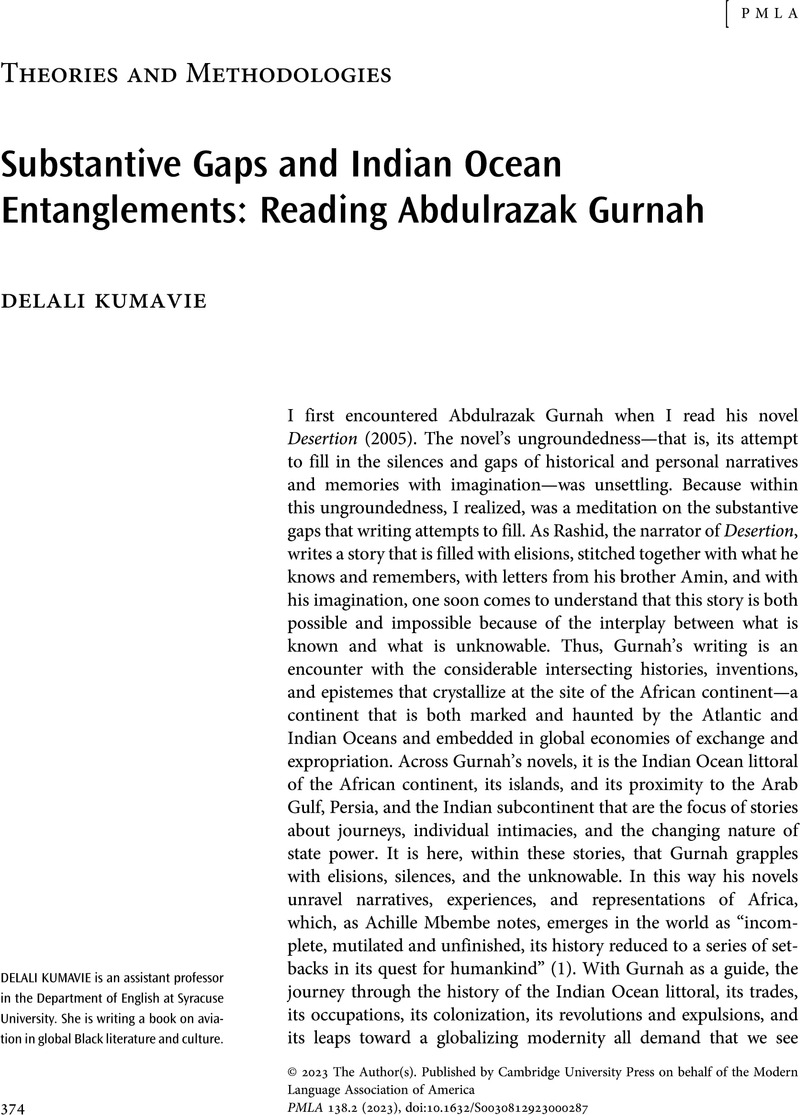No CrossRef data available.
Article contents
Substantive Gaps and Indian Ocean Entanglements: Reading Abdulrazak Gurnah
Published online by Cambridge University Press: 16 May 2023
Abstract
An abstract is not available for this content so a preview has been provided. Please use the Get access link above for information on how to access this content.

- Type
- Theories and Methodologies
- Information
- Copyright
- Copyright © 2023 The Author(s). Published by Cambridge University Press on behalf of the Modern Language Association of America
References
Works Cited
Cooper, Cecilio. “Fallen: Generation, Postlapsarian Verticality + the Black Chthonic.” Rhizomes, no. 38, 2022, https://doi.org/10.20415/rhiz/038.e01.Google Scholar
Datta, Sreya Mallika. “Swahili Transmodernity and the Indian Ocean: Abdulrazak Gurnah's Ethic of Community in By the Sea, Desertion, and Gravel Heart.” Postcolonial Text, vol. 14, nos. 3–4, 2019, EBSCOhost, search.ebscohost.com/login.aspx?direct=true&db=mzh&AN=202019142231&site=ehost-live.Google Scholar
Elden, Stuart. “Secure the Volume: Vertical Geopolitics and the Depth of Power.” Political Geography, vol. 34, May 2013, pp. 35–51.CrossRefGoogle Scholar
Gurnah, Abdulrazak. “Abdulrazak Gurnah in Conversation.” Interview conducted by Nisha Jones. Wasafiri, vol. 20, no. 46, 2005, pp. 37–42.Google Scholar
Gurnah, Abdulrazak. “Nobel Lecture.” The Nobel Prize, Nobel Prize Outreach AB 2023, 7 Dec. 2021, www.nobelprize.org/prizes/literature/2021/gurnah/lecture/.Google Scholar
Gurnah, Abdulrazak. “Writing and Place.” World Literature Today, vol. 78, no. 2, 2004, pp. 26–28.CrossRefGoogle Scholar
Helff, Sissy. “Measuring Silence: Dialogic Contact Zones in Abdulrazak Gurnah's By the Sea and Desertion.” Matatu, vol. 46, 2015, pp. 153–67.CrossRefGoogle Scholar
Jackson, Zakiyyah I. Becoming Human: Matter and Meaning in an Antiblack World. New York UP, 2020.CrossRefGoogle Scholar
Kaigai, Kimani. “At the Margins: Silences in Abdulrazak Gurnah's Admiring Silence and The Last Gift.” English Studies in Africa, vol. 56, no. 1, 2013, pp. 128–40.CrossRefGoogle Scholar
Kumavie, Delali. “Trapped in the Airport: Borders, Hauntings and the Myth of the Global Citizen in Abdulrazak Gurnah's By the Sea.” Postcolonial Texts, vol. 16, no. 3, 2021, EBSCOhost, search.ebscohost.com/login.aspx?direct=true&db=mzh&AN=202123581153&site=ehost-live.Google Scholar
Mamdani, Mahmood. Define and Rule: Native as Political Identity. Harvard UP, 2012.CrossRefGoogle Scholar
Melamed, Jodi. Represent and Destroy: Rationalizing Violence in the New Racial Capitalism. U of Minnesota P, 2011.CrossRefGoogle Scholar
Mirmotahari, Emad. “From Black Britain to Black Internationalism in Abdulrazak Gurnah's Pilgrims Way.” English Studies in Africa, vol. 56, no. 1, 2013, pp. 17–27.CrossRefGoogle Scholar
Ngũgĩ wa Thiong'o. Something Torn and New: An African Renaissance. BasicCivitas Books, 2009.Google Scholar
“Prize Announcement.” The Nobel Prize, Nobel Prize Outreach AB 2023, 13 Mar. 2023, www.nobelprize.org/prizes/literature/2021/prize-announcement/.Google Scholar
Samuelson, Meg. “Abdulrazak Gurnah's Fictions of the Swahili Coast: Littoral Locations and Amphibian Aesthetics.” Social Dynamics, vol. 38, no. 3, 2012, pp. 499–515.CrossRefGoogle Scholar
Spillers, Hortense J. “Peter's Pan: Eating in the Diaspora.” Black, White, and in Color: Essays on American Literature and Culture. U of Chicago P, 2003, pp. 1–64.Google Scholar
Steiner, Tina. “Writing ‘Wider Worlds’: The Role of Relation in Abdulrazak Gurnah's Fiction.” Research in African Literatures, vol. 41, no. 3, 2010, pp. 124–35.CrossRefGoogle Scholar
Trouillot, Michel-Rolph. “The Perspective of the World: Globalization Then and Now.” Beyond Dichotomies: Histories, Identities, Cultures, and the Challenge of Globalization, edited by Mudimbe-Boyi, M. E., State U of New York P, 2002, pp. 3–20.Google Scholar
Wynter, Sylvia. “Unsettling the Coloniality of Being/Power/Truth/Freedom: Towards the Human, after Man, Its Overrepresentation—An Argument.” CR: The New Centennial Review, vol. 3, no. 3, 2003, pp. 257–337.CrossRefGoogle Scholar
Zondi, Mlondolozi. “Haunting Gathering: Black Dance and Afro-Pessimism.” ASAP Journal, vol. 5, no. 2, 2020, pp. 256–66.CrossRefGoogle Scholar




